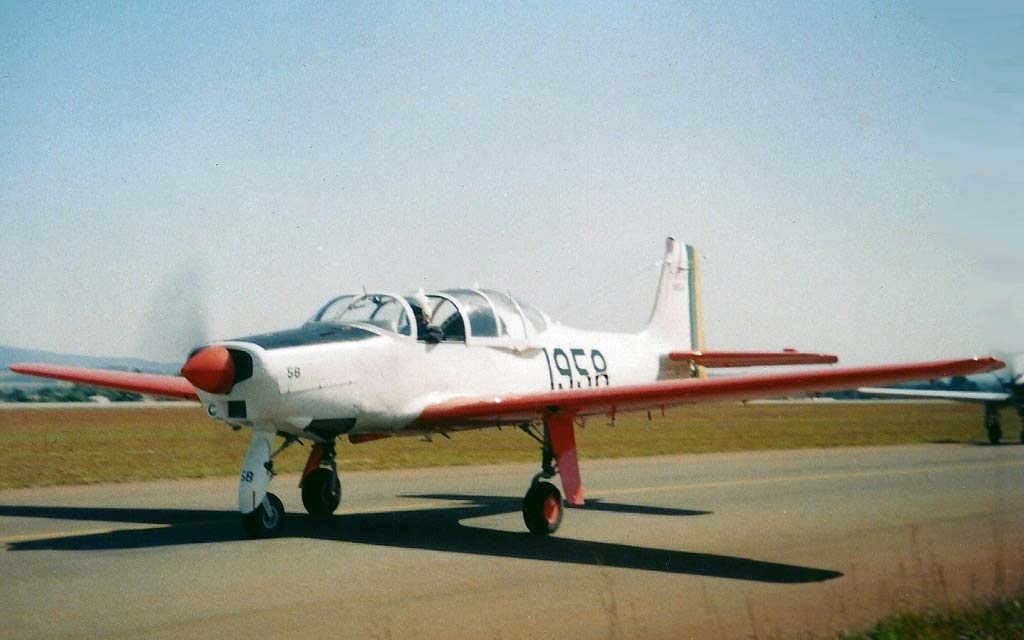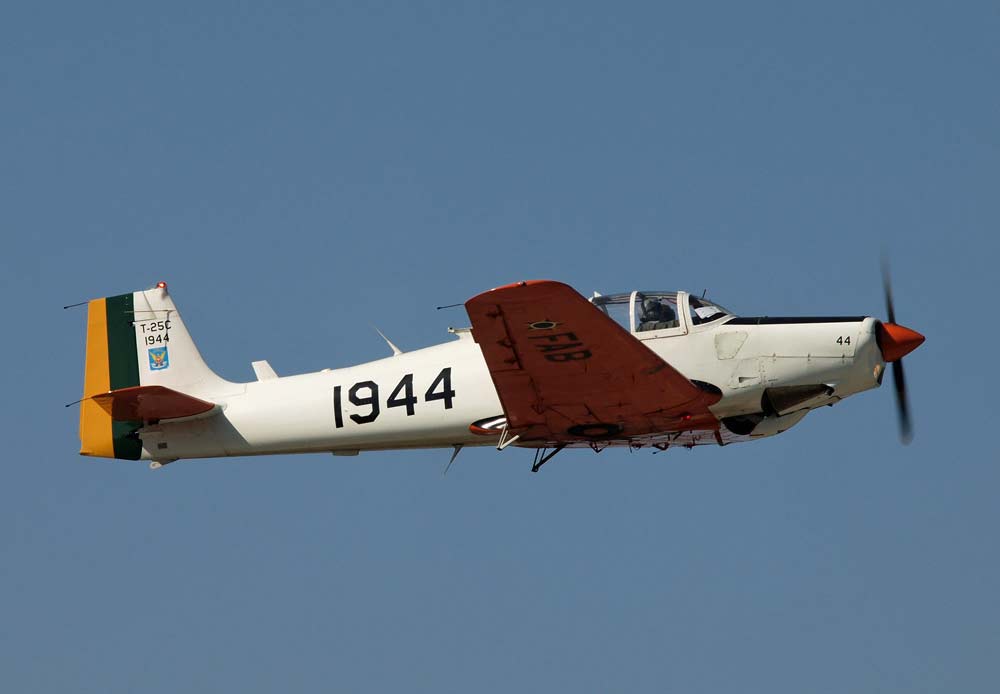The Neiva T-25 Universal is a robust, single-engine, primary trainer aircraft designed for basic pilot training, known for its simplicity and reliability.
In brief
The Neiva T-25 Universal is a single-engine, low-wing monoplane designed primarily for military pilot training. Manufactured by Industria Aeronautica Neiva in Brazil, it features a piston engine, fixed tricycle landing gear, and a side-by-side seating configuration optimal for instructional purposes. Introduced in the 1960s, it has served primarily in the Brazilian Air Force for basic flight training, embodying a straightforward, durable design conducive to the rigors of novice pilot instruction. The aircraft is equipped with a Lycoming O-540 engine, capable of producing 260 horsepower, allowing for effective teaching of fundamental flying skills, including aerobatics, navigation, and formation flying.
The Neiva T-25 Universal stands out as a significant contribution to military aviation training, offering a blend of simplicity, durability, and effectiveness in the foundational stages of pilot instruction.

History of the Development of the Neiva T-25 Universal
The Neiva T-25 Universal was developed in the early 1960s by Industria Aeronautica Neiva, a Brazilian aerospace manufacturer, in response to the Brazilian Air Force’s need for a modern, reliable primary training aircraft. The intention was to replace older training aircraft with a more contemporary and locally produced model, reducing reliance on foreign-made trainers and fostering the national aerospace industry.
The program was initiated under the guidance of the Brazilian Air Force, which sought an aircraft capable of providing comprehensive training to its cadets, from basic flight principles to more advanced flying techniques. The T-25 was designed to be easy to maintain, cost-effective, and versatile, capable of operating in the diverse climatic and geographical conditions of Brazil.
The aircraft first flew on April 21, 1964, marking a significant milestone in Brazilian aviation history. It was tailored to meet the instructional needs of military aviation cadets, emphasizing ease of handling, reliability, and safety – crucial attributes for an aircraft involved in the early stages of pilot training.
While the T-25 does not have a NATO nickname, its service within the Brazilian Air Force and its export to other nations underline its success as a primary training aircraft.
Design of the Neiva T-25 Universal
The Neiva T-25 Universal features a pragmatic and functional design optimized for training purposes. It is a low-wing monoplane with a predominantly metal structure, providing durability and ease of maintenance. The aircraft’s configuration includes fixed tricycle landing gear, which offers robustness and reliability, essential for withstanding the rigors of frequent takeoffs and landings during training missions.
Powered by a six-cylinder Lycoming O-540 engine, the T-25 Universal delivers a balance of power and efficiency, making it suitable for a range of training exercises, from basic flight maneuvers to more complex aerobatic procedures. The engine’s reliability and the aircraft’s mechanical simplicity ensure low operational costs and ease of maintenance, crucial factors for a training fleet.
The cockpit of the T-25 is designed for two occupants with side-by-side seating, which is ideal for instructional flights where close communication between the student and instructor is necessary. The expansive canopy provides excellent visibility, aiding students in developing situational awareness and visual flying skills.
Performance of the Neiva T-25 Universal
The T-25 Universal’s performance characteristics make it well-suited for its training role. It has a maximum speed of around 283 km/h (176 mph) and a service ceiling of 4,450 meters (14,600 feet), sufficient for executing a wide array of training maneuvers and procedures. The aircraft’s range of over 1,000 kilometers (621 miles) allows for extended training sessions, including cross-country navigation exercises.
Its handling qualities are particularly forgiving for novice pilots, with responsive controls and stable flight characteristics. The aircraft’s ability to perform basic aerobatics, combined with its sturdy construction, makes it an excellent platform for introducing cadets to a variety of flying experiences, including unusual attitude recovery and the fundamentals of aerodynamic principles.
Variants of the Neiva T-25 Universal
The T-25 Universal has seen a few variants over its service life, mainly differing in avionics upgrades and minor modifications to suit different training needs or export requirements. The primary variant is the T-25A, the standard model used by the Brazilian Air Force. Later versions included updates in cockpit instrumentation and systems to enhance training effectiveness and safety.

Military Use and Combat of the Neiva T-25 Universal
The T-25 Universal has been extensively used by the Brazilian Air Force for basic flight training, instrumental in shaping the skills of novice pilots. Its role has been predominantly in the training arena, without direct involvement in combat operations. The aircraft’s design focuses on training efficiency rather than combat capability, emphasizing flight instruction, aerobatic maneuvers, and pilot orientation.
Its widespread use in Brazil and adoption by other countries for military training underlines its success as a reliable training tool, contributing significantly to the development of competent aviators. The T-25 has also participated in various international military training exercises, showcasing its capabilities in a range of flying conditions and operational environments.
The Neiva T-25 Universal exemplifies the essential qualities of an effective primary training aircraft: simplicity, reliability, and versatility. Its enduring service in the Brazilian Air Force and beyond attests to its successful design philosophy, meeting the rigorous demands of pilot training while fostering the growth and proficiency of future aviators. The T-25’s legacy is marked by its significant contribution to military aviation training, underlining the importance of a solid foundation in the making of skilled pilots.
Back to the Trainers section.